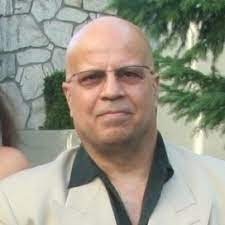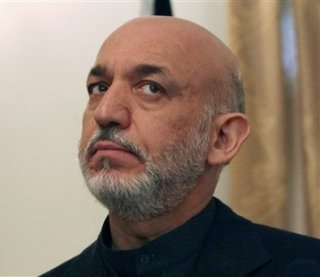By Khalil Nouri STAFF WRITER / EDITOR
It’s ludicrous that in a matter of weeks Mr. Karzai has gone from being a frail, faltering, unqualified leader hampered by a deceitful family, to the man who will magically bring together the disparate welfare of Afghans with his commendable leadership.
The boosting of President Hamid Karzai’s credibility that now paints him as a true national leader not only shows the West’s insincerity in Afghanistan but exposes the futile inconsistencies in efforts by the United States to accomplish its goals; especially regarding the recent Loya Jirga and the upcoming Kandahar operation.
THE LOYA JIRGA CHIP
One of the few critical bargaining chips left to Mr. Karzai, that he had to bring to the table in an effort to reconcile the disenchanted Taliban, was the recent professed peace Jirga convened in Kabul.
In his opening statement Karzai said, “Make peace with me and there will be no need for foreigners here. As long as you are not talking to us, not making peace with us, we will not let the foreigners leave.” But the opposition answered him with their own message of rocket attacks and violence that disrupted the Jirga assembly for over 45 minutes; and the fact that he later had to oust two of his trusted security personnel for security breaches, as a result, only accentuated this sure sign of failure.
As Jawaharlal Nehru said, “Failure comes only when we forget our ideals, objectives and principles.”
There is no doubt that Afghanistan is the land of Jirgas; and for centuries Afghans have used Jirgas to resolve differences amongst each other, no matter what outcomes resulted. But markedly, the ancestral Afghans convened Jirgas per their own discretion that was free of foreign interference and demands.
The aforesaid Jirgas many decades ago were all an indigenous mindset of ideals, objectives and principles; but the recent one, failed at its outset core mindset foundation. Ironically, these most recent Afghan Jirgas have become submissive, less spirited, and above all biased where the participants are handpicked for their positive assertions in favor of puppet governments. And since the outcome is already declared positive by the majority of participants ahead of the meeting, it is fair to say that this customary tribal council is now being abused to confirm pre-planned outcomes because of its grassroots footing.
In our indigenous view, the simple outcome to that notion is; it will not work in the long run!
The Russian puppet communist regime in Kabul headed by Dr. Najibullah had a relatively better understanding of Afghans. He convened the Loya Jirga three months after Soviet withdrawal, on May 20, 1989. The planned idea was to sell a similar reconciliation initiative to the Afghans by painting the notion that the foreign forces were already out of Afghanistan. But it was also marred with violence and disrupted for several hours, and it evidently failed in its core concept.
There is a misconception, by the fact that too many in the West think that the recent consultative Loya Jirga was entirely an Afghan-led process, and the West never participated in its course of action. It is a bewildering fact, and equally an, Afghan mindset that suggests that the presence of foreign forces deeply tarnishes the trustworthiness of the Jirga.
In hindsight, Mr. Karzai’s bargaining chip for the Loya Jirga was a waste of time for not convening in a normal tribal structure with true participation from the people; and more importantly, because the central government has foreign allegiance and lacks indigenous norms.
THE KANDAHAR CHIP
The next bargaining chip for Mr. Karzai is to prove his effectiveness in concert with the NATO alliance in Kandahar where the rumored view is a go-for-broke move.
But the results in Marjah associated with the failed “government in the box”, profoundly reflects the probable outcome in Kandahar. If the current measure for victory in Marjah is allowing Taliban rule at night and government rule during the day, then I would consider that a hollow and disastrous one. Thus, by these standards, believing the Kandahar operation with a much bigger populace will also fail is only par for this course of action.
Moreover, General Stanley McChrystal in a statement said, “This is a bleeding ulcer right now.”
The progress in Marjah has been slow, however, in part because no one who planned the operation realized how hard it would be to convince residents that they could trust representatives of an Afghan government that would send in corrupt police and inept leaders who would cause people to turn to the Taliban.
Another factor of Karzai’s bargaining chip in Kandahar is the issue of his half brother Ahamad Wali Karzai, who drastically exerts his family’s power over the entire Kandahar tribal makeup and is viewed as a hindrance to any operations in Kandahar.
General Stanley McChrystal’s team once talked openly about the need to remove him from power but that idea is now in reversal mode; for now Wali Karzai will stay and continue en route to his manipulative achievements.
IN CONCLUSION
For the past nine years, American governments have been naïve and confused in their big business with Karzai. During this time, the Afghan president has never considered good governance to be a serious issue –why should he suddenly be expected to do so now? The lack of trust between Karzai and America is in ascension, and if his bargaining chips cannot bring achievements, then what is next for Mr. Karzai? Or will he be given more chips to play with?
Here are a few chips that I would like to lay on the table:
Mr. Karzai, what Afghanistan needs today is a leader in the image of America’s George Washington, and South Africa’s Nelson Mandela. Here are two leaders who could have ruled for as long as they wished, but both men chose to be leaders rather than rulers. Neither sought personal power, and neither was corrupted by the power of their office. Both men taught their nation and the world about the responsibility of leadership after a great struggle by teaching others by example. By knowing when and how to properly let go of power, both leaders became beloved treasures who set the cornerstones for national leadership behavior for future generations. They both taught fighting men how to heal their nation’s wounds.
What can you do Mr. Karzai? You can call for a real Afghan government that the entire nation can accept: a Constitutional Monarchy, headed by a descendant of the former royal Head of State. You could call a real Loya-Jirga for the purpose of choosing candidates for the crowning of a new 21st Century royal Afghan Head of State; a new Constitutional Monarch; a new Afghan King.
The nation would then have to change the existing constitution from the current Presidential System to something like a parliamentary system with a prime minister, or go back to the old constitution that predates the Soviet Invasion of 1979.
The people of Afghanistan would love you forever if you returned them to the kind of leadership that they know and understand; the kind of Afghan leadership that they themselves have chosen for and among themselves for thousands of years.
I also would start to sing your praises, and would call for a new city to be built and named in your honor.
Khalil Nouri is the cofounder of New World Strategies Coalition Inc., a native think tank for nonmilitary solution studies for Afghanistan. www.nwscinc.org

Khalil Nouri was born in an Afghan political family. His father, uncles, and cousins were all career diplomats in the Afghan government. His father was also amongst the very first in 1944 to open and work in the Afghan Embassy in Washington D.C., and subsequently his diplomatic career was in Moscow, Pakistan, London and Indonesia. Throughout all this time, since 1960’s, Khalil grew to be exposed in Afghan politics and foreign policy. During the past 35 years he has been closely following the dreadful situation in Afghanistan. His years of self- contemplation of complex Afghan political strife and also his recognized tribal roots gave him the upper edge to understand the exact symptoms of the grim situation in Afghanistan. In that regards, he sees himself being part of the solution for a stable and a prosperous Afghanistan, similar to the one he once knew. One of his major duties at the beginning of Operation Enduring Freedom in Afghanistan in 2002 was advisory role to LTG Franklin Hegenbeck. He has worked closely with the Afghan tribes and his tribal exposure is well tailored for unobstructed cross-cultural boundaries within all Afghan ethnicities. He takes pride in his family lineage specifically with the last name “Nouri” surnamed from his great-grandfather “Nour Mohammad Khan” uncle to King Nader-Shah and governor of Kandahar in 1830, who signed the British defeat and exit conformity leaving the last Afghan territory in second Anglo-Afghan war. Khalil is a guest columnist for Seattle Times, McClatchy News Tribune, Laguna Journal, Canada Free Press, Salem News, Opinion Maker and a staff writer for Veterans Today. He is the cofounder of NWSC Inc. (New World Strategies Coalition Inc.) a center for Integrative-Studies and a center for Integrative-Action that consists of 24- nonmilitary solution for Afghanistan. The function of the Integrative-Studies division (a native Afghan think tank) is to create ideas and then evolve them into concepts that can be turned over to the Integrative-Action division for implementation. Khalil has been a Boeing Engineer in Commercial Airplane Group since 1990, he moved to the United States in 1974. He has a Bachelor of Science degree in Mechanical Engineering, and currently enrolled in Masters of Science program in Diplomacy / Foreign Policy.
ATTENTION READERS
We See The World From All Sides and Want YOU To Be Fully InformedIn fact, intentional disinformation is a disgraceful scourge in media today. So to assuage any possible errant incorrect information posted herein, we strongly encourage you to seek corroboration from other non-VT sources before forming an educated opinion.
About VT - Policies & Disclosures - Comment Policy




